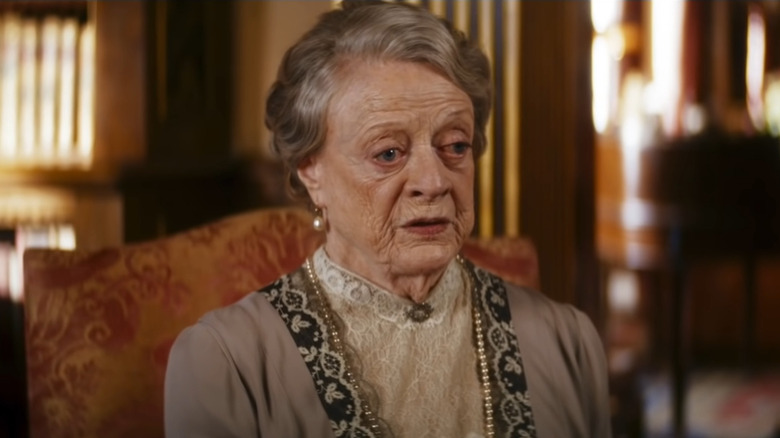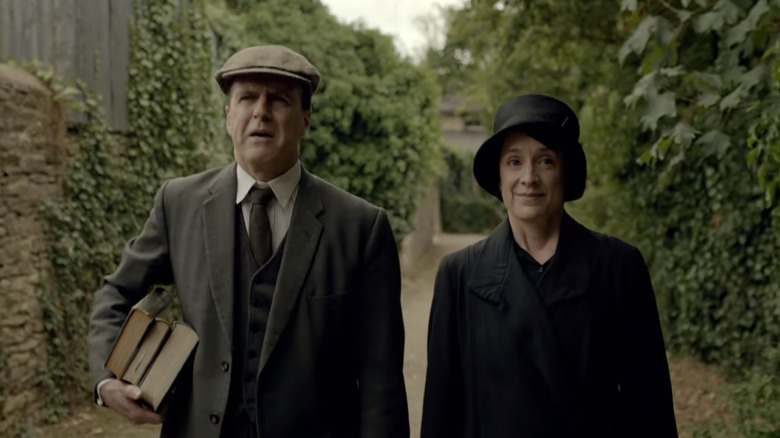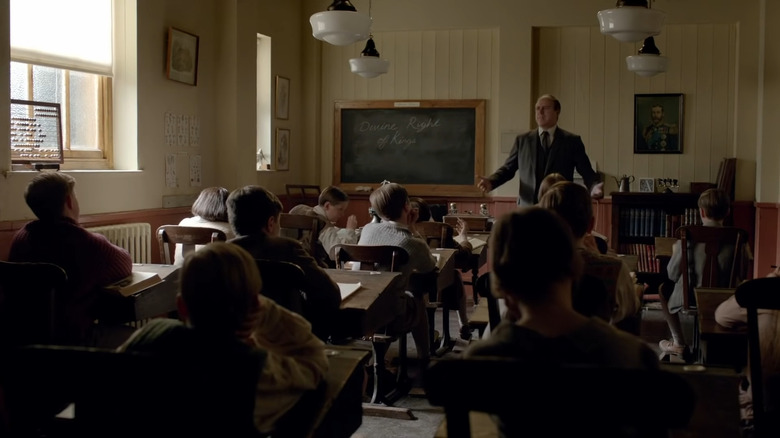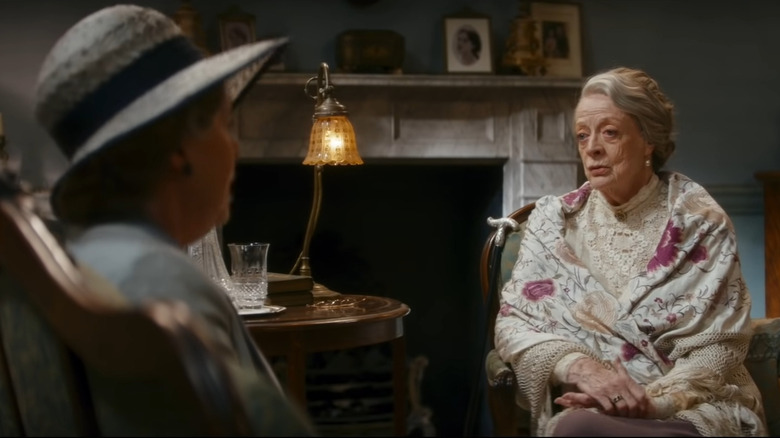How Downton Abbey Rejects Ageism
This post contains spoilers for "Downton Abbey: A New Era."
In film, and in society at large for that matter, there's an extremely high premium on youth and beauty. Too often, characters are treated as though they have a rapidly approaching expiration date as soon as they hit 30 — it's as though they're in "Logan's Run," desperately trying to avoid being sacrificed for the crime of a single gray hair. But "Downton Abbey," in its ambling, familiar way, does a tremendous amount to show that life doesn't end at middle age; that as long as someone is alive, they can still follow their dreams and play an active role in their own story.
The show has never shied away from depicting older characters in love, pursuing careers, and otherwise making plans that don't just involve end-of-life care. The second feature film "Downton Abbey: A New Era" has continued this trend, allowing characters who aren't quite spring chickens to have a sense of adventure in their lives.
Middle-aged puppy love
At the beginning of the 20th century, there was a general consensus that if a woman made it to her late 20s without a husband, she was doomed to a lifetime of loneliness: romance was simply never going to happen for her. Men had a bit more time to sort things out, but women had a narrow window indeed. We see glimpses of this in the "Downton Abbey" series — worries that Edith (Laura Carmichael) will never find a husband, the maids bemoaning their lack of opportunities to meet men while they're young. But there's also several relationships that defy this societal expectation, showing both men and women finding love well past the time of life when romance is traditionally depicted.
On the show, we see Carson (James Edward Carter) and Mrs. Hughes (Phyllis Logan) get married as they approach their retirement years, and the widowed Isobel Crawley (Penelope Wilton) gets a second chance at love with the seemingly dull but deeply empathetic Lord Merton (Douglas Reith). "Downton Abbey: A New Era" doubles down on this. Mrs. Patmore (Lesley Nicol), the cook of Downton Abbey, strikes up a romance with Daisy's father-in-law Mr. Mason (Paul Copley), as the two agree to live out the rest of their lives together in her peaceful little cottage. And perhaps most endearingly, the oft down-on-his-luck Mr. Molesley (Kevin Doyle) is finally able to propose to Baxter (Raquel Cassidy), Cora Crawley's lady's maid, after dancing around a relationship for most of the 1920s.
The willingness to showcase these kinds of relationships does two things. Firstly, it's a welcome reminder that the middle-aged among us have so much more to look forward to in their lives; that their future is full of not a steady, downward decline, but hope and promise. Secondly, and perhaps most importantly, it stands in opposition to the common depiction of older people as invisible and sexless in society. It shows that middle-aged and elderly folks are attracted to one another, that they feel twinges of first love and lust and the desire for romantic companionship just like anyone else — that shouldn't be a radical act, but in the entertainment industry, it undeniably is.
Life and careers
But it's not just in the romance department that "Downton Abbey: A New Era" appears especially willing to treat its older characters as though they still have a promising future ahead of them. Molesley alone is proof.
A former servant turned schoolteacher, Molesley seems to have spent the majority of his life watching it pass him by. Towards the end of the show's run, we see him finally get a little bit of forward momentum, as he finds a hidden aptitude for education and takes on a position teaching history at the local school. "Downton Abbey: A New Era" takes this a step further — not only is he fairly well-settled in his new career, he demonstrates a rare gift on the set of the film shooting at Downton that lands him an offer to work as a screenwriter, directly collaborating with a leading director. The lesson here is filled with pure optimism: It's never too late. Whatever it is you wanted to make out of your life, you're never too old for a fresh start.
Even the characters with one foot in the grave, like Violet, the Dowager Countess (Maggie Smith), are given a rare sense of liveliness. She may be nearing the end of her life, but she is never anything less than an active player in it. The story treats her not as merely an invalid, but a woman who still has secrets and a hint of romance — she makes plans and secures the fortunes of her great-grandchildren where many other films might expect her to fade into the background.
Skewing to an older demographic
All of these choices compounded together create a franchise that celebrates the constantly evolving nature of each of its characters, young and old. The rapid changes that take place in "Downton Abbey" undeniably have an affect on the people who live and work at the estate; as the world rebuilds itself around them, they find opportunities to face the future with optimism as well. But while it serves a purpose within the story, the decision to focus a more significant portion of its attention on the lives of older characters also seems to have an impact on the demographics of viewers drawn to the show.
An appealing combination of prestige drama and soap opera set amidst the gilded manors of the early 20th century, "Downton Abbey" was always going to attract older audiences — the PBS set, for whom a historical drama is like catnip. But by giving them characters that they can more closely relate to, a film like "Downton Abbey: A New Era" may have hit on a winning strategy, providing true counterprogramming for those who aren't won over by the endless series of superhero movies from Marvel and DC.
"Downton Abbey: A New Era" earned $16 million during its opening weekend, setting a pandemic record for Focus Features and proving that there is room at the multiplex for films that appeal to different audiences. Including, it would seem, those who are drawn to narratives that refuse to make their older protagonists stagnant and invisible.



